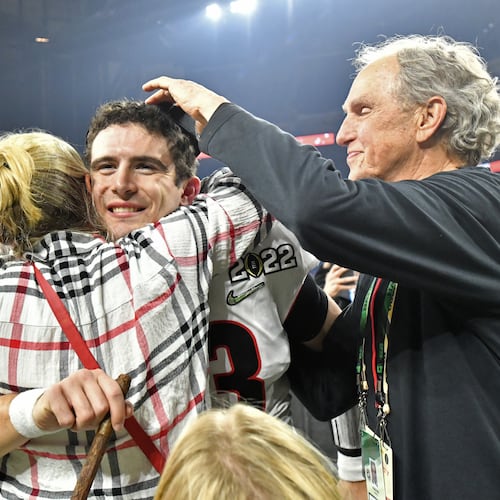Every baseball team would like to think it possesses late-inning, last-at-bat moxie. Just like every guy would like to think he is going to be the next James Bond. But that just ain’t so.
Every team talks about wanting to grind out each plate appearance as if that day’s meal depended upon it. Yes, you preach about playing to the final pitch of the last inning. You assume that should be the least expected of those who play for millions. But then, the Braves show them how it’s actually done.
They didn’t need their gift for late-inning drama Sunday against the Mets, scoring early to win a game with atypical ease, 4-0. They instead relied upon home-field advantage — they’re 5-0 at Truist so far this season — a practical reminder of how we’re all better off now the more we stay at home.
But they keep in their back pocket the certain knowledge that they have won far more than their fair share of games late — the count’s at 79 final at-bat victories since Brian Snitker first took over as interim manager in May 2016, the most of any team in the majors since then. Such knowledge is good to always keep handy, like jumper cables or an umbrella. Because eventually you’ll need to put it to use.
How does a team go about turning the trait of being resilient and stubborn and determined into a specialty?
Snitker is better at setting the foundation for such attributes than he is explaining them.
Why have his teams done such an exceptional job keeping the faith to the end — the Braves have led the National League in last at-bat wins in three of the last four years — above so many others?
“It’s hard to pinpoint,” he said. “I call it that ‘it factor.’ Some teams have it and some teams don’t. I just think it’s the makeup of this club and how they love to compete and play baseball and work. They thrive on that competition. They keep that line moving offensively. I can’t point to anything other than the makeup of the individual guys is so strong, they are such competitors.”
And can it be that the more the Braves have manufactured the late-inning victory, the more they’ll win games like that in the future? The trait perpetuates itself; it becomes a learned and familiar response.
“We’ve played so many close games over the years and came back a lot,” Snitker said. “Everybody has confidence, they don’t panic when things don’t go their way early or even late in a game. I think they’re of the opinion as long as they have a strike left, they have a chance to win. They’ve proven that again and again. Situations don’t seem to overwhelm them at all.”
Some other numbers from 2019 that indicate a team with a stubborn streak: The Braves were 11-6 in extra-inning games and their eight walk-off wins were third most in the National League.
The backbone of their current five-game winning streak is Friday’s comeback win over the Mets, in which the Braves trailed 10-6 going into the bottom of the eighth but put up a five-spot there and won 11-10. Like a July 25 win over the Mets in New York, which Marcell Ozuna sent into extra innings with a two-out, two-strike home run in the ninth, these kind of victories have a stirring quality to them. They are the kind of victories that sustain you through the summer.
The newest Braves are the ones who have perpetuated the last at-bat image this year — be it Ozuna’s enabling home run a week ago or Travis d’Arnaud’s five RBI Friday. It’s like they can just pick up the habit on the bottom of their shower shoes while walking around the Braves clubhouse.
So much plays into this ability to win late: A lineup that can pile up runs on command; a bullpen that can keep a team viable long enough to come back; an attitude that it might be more fun to try to win a game than to get out of those dirty, smelly uniforms and get home early.
After his big game Friday, d’Arnaud wanted to credit upper management: “It all starts with Snit giving good energy the whole game, regardless if we’re down 8-2 or up by a ton of runs ... He’s always in a great mood. Uplifts you when you’re down.” Snitker has 325 career wins as a Braves manager, 24% of which have come in the final at-bat.
As the Braves’ young Austin Riley put it, “To never be out of a game at all makes the full nine innings very pleasurable.”
You might even seize on the knack for keeping things interesting to the end — even when it appears all is lost — as the Braves most likable quality. Especially now when you want to cling to every game for as long as possible, fearful that if you turn the channel, it may not be back tomorrow.
About the Author
The Latest
Featured


